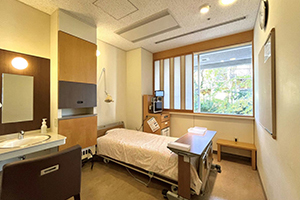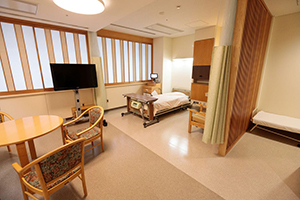- HOME
- Department
- Palliative Care
Palliative Care

(1) Overview
To alleviate the various physical and emotional pains associated with cancer and allow patients to spend meaningful time with their families, we provide specialized palliative treatment and care in both outpatient and inpatient settings.
The Department of Palliative Care focuses on easing the numerous pains caused by cancer (malignant tumors), helping patients to live as comfortably and true to themselves as possible.
Pain associated with cancer is not limited to physical pain caused by the disease; it includes a wide range of symptoms such as nausea, fatigue, and emotional distress, as well as concerns about the future. Reducing this suffering as much as possible is essential to maintaining the patient’s Quality of Life (QOL).
For patients undergoing cancer treatment, such as surgery, chemotherapy, hormone therapy, or radiation therapy, we work with the primary treatment department to control symptoms to ensure that cancer treatment proceeds smoothly. For cancer pain, which is said to affect 20–50% of patients at diagnosis, we begin pain-relieving treatments early after diagnosis. We also address symptoms affected by pain, such as appetite and sleep, to help maintain physical and mental strength, enabling smooth continuation of cancer treatment. Additionally, we work with the primary department to manage side effects of cancer treatments and control pain around the time of surgery.
When further cancer treatment becomes challenging and the patient meets the admission criteria, they can be admitted to the Palliative Care Ward, a specialized ward that eases physical and emotional pain. If symptoms improve after admission, we also support discharge planning for home care.
(2) Policy
Supporting the “Quality of Life” of Patients Through Team-Based Care
To support patients’ Quality of Life (QOL), a multidisciplinary team consisting of palliative care doctors, nurses, pharmacists, registered dietitians, rehabilitation therapists, social workers, and licensed psychologists works together to assist cancer patients and their families.
(3) Palliative Care Ward
The Palliative Care Ward is a specialized ward aimed at relieving the physical and emotional distress of patients who have completed cancer treatment.

private rooms (no extra charge)

paid private rooms (2 types)
In the Palliative Care Ward, we provide palliative treatment and care centered on drug therapy to alleviate discomfort. Additionally, we utilize the resources of our comprehensive hospital, offering treatments such as radiation therapy, nerve blocks, and rehabilitation to relieve symptoms. Our goal is to enable patients and their families to spend peaceful time together, not only by alleviating uncomfortable symptoms such as pain and fatigue but also by reducing emotional distress and providing support for home care if desired.
(4) Application for Admission to the Palliative Care Ward
Current patients at our hospital should inform their primary physician of their desire to apply for the Palliative Care Ward. Consultations and interviews are conducted to explain the details and confirm the patient’s and family’s wishes.
For patients outside our hospital (including those who have previously received treatment here but are currently undergoing cancer treatment at another hospital), please submit the specified documents listed below.
In both cases, please discuss and agree on the “Admission Criteria for the Palliative Care Ward” with the patient, family, and primary physician before applying.
Admission Criteria for the Palliative Care Ward
- The patient understands their condition and wishes to prioritize relief from cancer pain in the Palliative Care Ward rather than curative treatment.
*For patients currently undergoing cancer treatment, please apply after treatment completion. - The patient does not wish for cardiopulmonary resuscitation (CPR) or life-prolonging procedures.
*In case of worsening health, these measures are considered to increase pain without providing significant relief. - If symptoms ease and the condition stabilizes after admission, discharge planning for home care or transfer will be discussed.
*Depending on the condition and living environment, discharge home, transfer to another hospital, or admission to a facility will be discussed. If symptoms worsen after relocating, re-admission to the Palliative Care Ward is possible. - Admission solely for long-term care is not supported.
*To accommodate as many patients needing symptom relief as possible, admissions for long-term care are not accepted. If the length of stay becomes extended, transfer to a paid room may be discussed.
(5)Palliative Care Team
The Palliative Care Team is comprised of doctors, nurses, pharmacists, registered dietitians, and others with deep knowledge and qualifications in palliative care. Working with the primary doctor and nursing staff, they specialize in relieving physical and emotional pain and providing palliative care in both inpatient and outpatient settings.
The center of palliative care is the patient. The Palliative Care Team supports the patient and family in alleviating symptoms, considering treatment location and care preferences, and helping patients lead a life true to their wishes. Please feel free to consult with the primary doctor or nurse if you wish to receive care from the Palliative Care Team.
(6)Palliative Care Outpatient Services
The Palliative Care Team provides regular outpatient consultations to help patients experiencing difficult-to-relieve symptoms receive treatment smoothly. When necessary, we collaborate with other specialized departments, such as Pain Clinic and Radiation Oncology, for more effective pain relief.
For patients at other hospitals seeking symptom relief
Palliative care outpatient services are available for cancer patients who find symptom relief challenging despite treatment at other hospitals. Since prior reservations are necessary, please consult with your current hospital’s primary doctor, and have the current medical institution contact our hospital’s Medical Cooperation Office.
Outpatient Schedule (First Visit):Wednesdays and Fridays, 2 PM – 3 PM
Eligibility:Patients receiving treatment at external medical institutions who are experiencing difficulties with symptom relief related to cancer.
Required Documents:
①A medical report from the current attending physician (including reasons for the need for palliative care, details of current cancer treatment and symptom management, and future treatment plans).
②Blood test data.
③Imaging data (including interpretation reports).
Application Process:
Please have the referring medical institution fax the medical report and recent blood test data to our Medical Cooperation Office atFAX(03-3448-6071)
After reviewing the documents, the office will contact the referring medical institution to confirm acceptance and arrange an appointment if applicable.
Items to Bring for the First Visit:
Original medical report, blood test data, imaging data (including interpretation reports)
Medication record book
Individual Number Card (My Number Card) or health insurance card
Pain diary (if available)
Hospital card if you have a prior treatment history with us